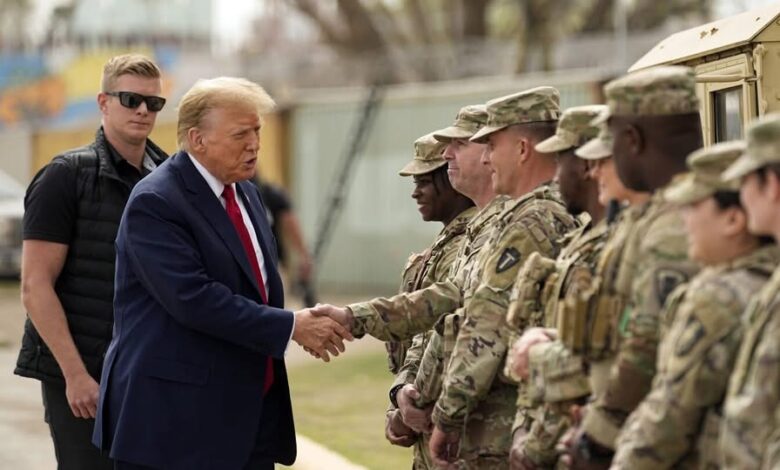Trump Orders U.S. Marines to Strategic Location Details Emerging

The U.S. military has confirmed a high-profile and controversial deployment: 200 U.S. Marines are being sent to Florida to assist Immigration and Customs Enforcement (ICE). This announcement has stirred debate across the nation, raising questions about the role of the military in domestic operations and the optics of armed service members working alongside federal immigration authorities.
Officials emphasize that the deployment is strictly administrative and logistical in nature. These Marines will not participate in law enforcement actions or confront civilians. Instead, their mission is to provide support within ICE detention facilities, streamlining operations and offering operational assistance behind the scenes.
Still, the very idea of Marines in uniform appearing alongside ICE agents has sparked outrage among activists, advocacy groups, and some political leaders. Critics argue that the move blurs the line between military and civilian law enforcement, raising concerns about the militarization of immigration policy.
Details of the Deployment
According to statements from the Department of Defense and ICE, the 200 Marines will be stationed temporarily in Florida, supporting administrative functions that range from record management to logistical coordination within detention facilities.
This deployment is part of a broader strategy to reinforce ICE operations in several high-tension states, including Louisiana and Texas. Officials say that the Marines’ assistance will help streamline workflow, improve efficiency, and free up ICE personnel to focus on core immigration enforcement duties.
Despite the clarification that these are non-combat roles, the announcement has prompted intense scrutiny and heated debate. Images of Marines in uniform on the grounds of ICE facilities, even performing administrative tasks, have sparked concerns about public perception and civil liberties.
The Military’s Role in Domestic Affairs
The U.S. Constitution and federal law place strict limits on the military’s role in domestic law enforcement. The Posse Comitatus Act, for example, prohibits the Army and Air Force from directly enforcing laws on U.S. soil without explicit Congressional authorization. While the Act does not technically cover the Marine Corps, the spirit of civilian oversight and limiting military involvement in policing still applies.
Supporters of the deployment argue that Marines are performing non-law enforcement duties, and thus, no laws are being violated. “These are strictly support roles,” said a senior defense official. “There is no combat or law enforcement action involved. They are simply providing logistical and administrative assistance.”
Critics counter that the optics matter just as much as the legality. “Even if Marines aren’t arresting anyone, their presence creates a militarized environment,” said one immigration rights advocate. “It sends a chilling message to communities and may intimidate people unnecessarily.”
The Political Context
This deployment comes amid ongoing national debates over immigration policy, border security, and federal enforcement practices. Several states, particularly in the South, have experienced heightened tensions around ICE operations, prompting federal authorities to seek additional support.
For some, deploying Marines represents a signal of political strength and commitment to enforcing federal immigration policies. Proponents argue that it ensures ICE has the resources it needs to manage detention centers efficiently, especially in areas where staffing shortages or administrative bottlenecks have created operational challenges.
Opponents see it differently, framing the decision as an unnecessary militarization of civilian operations and a politically charged move aimed at signaling toughness rather than addressing practical needs.
Public Reaction and Controversy
The announcement has ignited passionate reactions online and in the press. Social media platforms are flooded with both criticism and support.
Many citizens expressed concern that using Marines in ICE facilities could escalate tensions or create confusion about the military’s role in civilian matters. Advocacy groups argue that immigration enforcement should remain entirely civilian, emphasizing community trust and constitutional protections.
At the same time, some commentators defended the deployment, highlighting that logistical and administrative support is a routine part of military operations. “Marines are trained to provide organization, structure, and efficiency,” said one supporter. “If ICE needs assistance in managing resources and processing detainees, there’s nothing inappropriate about it.”
Historical Precedents
The use of military personnel to assist civilian agencies is not unprecedented. Throughout U.S. history, service members have provided logistical support during natural disasters, public health crises, and other emergencies.
For example, during hurricane relief operations, troops are often called in to deliver supplies, manage shelters, and assist with coordination efforts. Similarly, military personnel have supported the Federal Emergency Management Agency (FEMA) and other agencies in purely non-law enforcement capacities.
However, deploying Marines to assist with immigration enforcement has unique sensitivities. Immigration issues are highly politicized and involve vulnerable populations, making any military involvement inherently controversial.